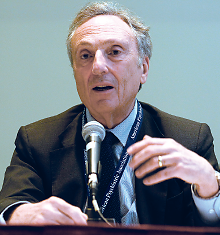Big-city police officers experience three life-threatening events a year on average, yet the normative response to traumatic stress is resilience, reported Charles Marmar, M.D., a professor and chair of psychiatry at New York University’s Langone Medical Center, at APA’s 2015 annual meeting in Toronto in May.
Predicting who will and who won’t develop symptoms of stress could help police forces improve training for all and lessen vulnerability.
Thirteen years ago, Marmar and colleagues began studying 400 candidates for police forces in San Francisco, Oakland, Calif., and New York City. They sought to find ways to help police, first responders, or soldiers prepare for and respond to stress, he said. “The idea was not to screen people out but to help them adapt better to the stress of these professions and provide early interventions to protect their resilience.”
The researchers gathered an array of data on demographic factors, family history, and stress biomarkers and administered a three-hour psychiatric evaluation.
Marmar and colleagues also measured cortisol levels, eye-blink responses, skin conductance, heart rate, and startle reactivity, among other data.
The prospective officers’ evaluation revealed they were remarkably healthy. No one was diagnosed with an Axis I disorder, their average IQ was 116, and 26 percent had been exposed to childhood trauma—roughly the same proportion as in the general population.
One test of stress reactions included showing recruits several videos, first a pleasant travelogue followed by a graphic film of a real police officer being blown up by a bomb he was trying to defuse. Marmar’s team measured stress hormone levels before and after the videos and asked the candidates how disturbed they felt.
Officers who had the highest cortisol response to the traumatic video were more likely to show resilience six years later after experiencing a stressor in their own lives. “A high cortisol response brakes the stress response,” he said.
Over six years they collected more than 2,000 data points on each officer. Managing the information gathered was a challenge that demanded innovative statistical tools to understand the interaction of so many variables.
Although the study is still under way, Marmar and his colleagues have reached some important preliminary observations at the end of six years.
For a start, some hypothesized risk factors proved to be wrong, he said. Gender did not predict outcome—women were as resilient as men. IQ was not a factor, either.
Catecholamine and acoustic startle responses to stress, peritraumatic panic or dissociation, and a family history of mood, anxiety, and substance use disorders were associated with PTSD symptoms at six years. Routine work stresses, such as scheduling issues or poor leadership, also were highly correlated with PTSD symptoms.
“Genetics has complex effects throughout this whole model,” said Marmar. “Genes contribute to risk-taking and risk-aversive behavior and thus how often police and soldiers get into life-threatening situations.”
The NFKBIA gene—a single variant inflammatory regulatory gene, which is involved in the regulation of the stress response—is associated with high resilience in policing.
Genes are just part of the story, said Marmar’s colleague, Isaac Galatzer-Levy, Ph.D., an assistant professor of psychiatry at the NYU School of Medicine.
“They produce indirect effects via intermediaries which can be modified,” he said. “It’s not a deterministic world.”
One major factor surprised Marmar and colleagues: the number of hours of sleep recorded while in the academy and at the end of the first year of service inversely predicted PTSD symptoms at six years.
“If you were sleeping well at the end of one year of police service, you were sleeping well at the end of six years of police service,” he said. Other factors like gene variants and cortisol levels complexly interact with sleep.
The presence of risk factors should not automatically be used to screen candidates out of the force, Marmar noted. Risk factors can be modified, and early interventions can lower risk over time. Officers with sleep problems can be assigned less shift work and given sleep hygiene training, for instance. The inflammatory response to stressors can be mitigated, and even gene expression can be modified with medications like dexamethasone given after traumatic events, Marmar said.
“People are not doomed to vulnerability or resilience,” Marmar noted. ■

